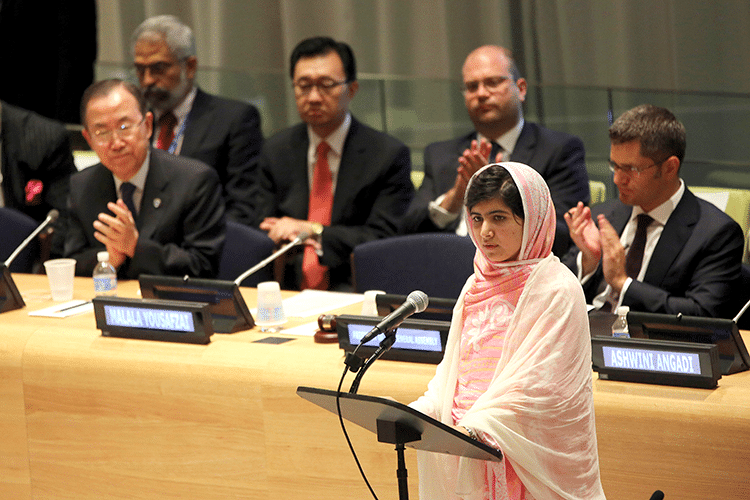Christina Lamb on Malala Yousafzai

AP Photo/Mary Altaffer
In winning the Nobel Peace prize together with Kailash Satyarthi, Malala Yousafzai has become the youngest Nobel laureate ever at age 17. Malala was shot by the Taliban in her native Pakistan two years ago for advocating for girls’ right to education. Back in 2013, when Malala addressed the United Nations, we interviewed Christina Lamb, the journalist who co-wrote Malala’s biography ‘I am Malala’. Here’s what Lamb told us about her time with the young icon.
“Malala is a fascinating mixture of being very politically mature and wise beyond her years, but also still just being a 16-year-old girl who fights with her brothers and likes playing games in the garden and joking. She’s just a girl. I always tease her because if you put a microphone in front of her she becomes a different Malala, and speaks like a politician. It was very nice to see that other side of her, not just the political side.
I didn’t realise how much she sparks things off until she came to London for the day in March. We met at the Southbank Centre, where there was a women’s event going on, and everybody was coming up to her and wanting a photograph taken with her. That’s when I became aware that she really is in a position to make a difference. She’s very aware of this herself. She seems to have touched a chord around the world and she’s determined to use her power.
Malala would be the first to say that she’s not unique. She was just unusual in being so outspoken in the very conservative Pashtun culture in which you don’t see women standing up or engaging with the media. When I went to her school in Swat I was amazed at how eloquent and passionate the other girls were too. They said ‘we could’ve all been Malala, but our parents would not have let us speak out.’ People said that her father pushed her. I wondered that too at the start, but having gotten to know her well, she’s very much her own person.
People sometimes forget the effects of Malala’s shooting on the rest of the family. Her father had a successful school and he told me that some kids are pulling out: it’s a double-edged sword going to Malala’s school and some people just don’t want that attention. It’s very hard for her mother too. She’s illiterate and from a very conservative family. I went to the village in Swat that she came from and they’ve been plunged into such a completely different life here in Birmingham.
To me, the most interesting thing about writing Malala’s book was hearing in depth from one family what it was like to live through the Taliban’s reign in the Swat Valley. I knew everything that had happened to them and their area, but speaking with them day after day about every detail really brought home what the Taliban did. Sadly the guy who was responsible for her shooting, Maulana Fazlullah, has now been made the head of the Taliban for Pakistan. Fazlullah is very ruthless, so I think it’s going to make it even harder to have any dealings or negotiations with them.
Malala is very determined to continue her battle, but she has GCSEs to do at school now. The school didn’t want her to keep taking time off to go and get awards and to do interviews, so they put their foot down. Recently she got an honorary degree from the University of Edinburgh and she joked to me ‘now I don’t need to do all these exams’. What’s nice is that she’s had such a weird life, she’s gotten so much adulation, so many celebrities and heads of state being in touch with her, and yet she’s still exactly the same.”
This interview is taken from issue #12 of Delayed Gratification, which is available in our shop.
Slow Journalism in your inbox, plus infographics, offers and more: sign up for the free DG newsletter. Sign me up
Thanks for signing up.





